

Dt. Natasha Mohan
Dietitian Natasha Mohan is one of the most influential and renowned nutritionist and dietitian, with over 3 Million Followers on YouTube and 200+ Million Views and with 10+ Years of Experience. Dietitian Natasha Mohan is a transformation expert, Motivational Speaker and Lifestyle Expert. She has touched million of lives. She specializes in Therapeutic Diets Like, PCOS/PCOD, Thyroid, Diabetes, Cholesterol, Blood pressure, and other lifestyle disorder.
Table of Contents
Best Indian Diet Plan for Weight Loss – Simple & Effective
Indian Diet Plan for Weight Loss is not about starving or cutting out all your favorite foods—it’s about creating a healthy, balanced lifestyle using traditional Indian meals in the right proportions. Indian cuisine is filled with nutrient-rich ingredients that can aid in weight loss naturally when paired with mindful eating and regular physical activity.
Why Choose an Indian Diet Plan for Weight Loss?
India has a rich culinary culture based on whole grains, pulses, spices, fresh vegetables, and dairy—all of which can support your weight loss journey. The key is to avoid deep-fried foods, excessive sugar, and processed snacks, and instead focus on whole, homemade meals.
Here’s how an Indian diet can support your weight loss goals:
Rich in Fiber: Ingredients like lentils, whole wheat, and vegetables help keep you full longer.
Low in Processed Foods: Traditional meals are usually cooked fresh, reducing calorie-dense preservatives.
Balanced Macronutrients: A proper Indian diet contains proteins, healthy fats, and carbohydrates in balanced amounts.
Sample Indian Diet Plan for Weight Loss
Below is a simple 1-day sample Indian Diet Plan for Weight Loss that you can adapt to your routine:
Morning (7:00 AM – 8:00 AM)
Start with warm water + 5 soaked almonds or a glass of methi (fenugreek) water
1 cup green tea or black coffee (no sugar)
Breakfast (8:30 AM – 9:30 AM)
1 vegetable-stuffed multigrain paratha with curd
OR1 bowl poha/upma with vegetables + 1 boiled egg
Mid-Morning Snack (11:00 AM)
1 fruit (apple, papaya, or orange)
1 glass buttermilk or coconut water
Lunch (1:00 PM – 2:00 PM)
1 cup brown rice or 2 multigrain rotis
1 cup dal or rajma or chole
Mixed vegetable sabzi
Salad and a bowl of curd
Evening Snack (4:30 PM – 5:30 PM)
Roasted chana or a handful of nuts
Herbal tea or lemon water
Dinner (7:30 PM – 8:30 PM)
1 bowl of moong dal soup or vegetable khichdi
Stir-fried vegetables or a salad
1 multigrain roti (optional)
Before Bed (9:30 PM – 10:00 PM)
Warm turmeric milk (haldi doodh) without sugar (optional)
Tips to Maximize Weight Loss with an Indian Diet Plan
Portion Control: Eating the right quantity matters. Avoid overeating even if it’s healthy food.
Hydration: Drink 2.5–3 liters of water daily.
Limit Sugar & Salt: These increase water retention and fat storage.
Avoid Fried and Junk Foods: Replace with baked or roasted alternatives.
Exercise Regularly: Combine your diet with a 30-minute workout—yoga, walking, or strength training.
Common Mistakes to Avoid
Skipping meals
Crash dieting
Overeating fruits or healthy snacks
Not reading food labels
Drinking fruit juices instead of whole fruits
Final Thoughts
Following an Indian Diet Plan for Weight Loss doesn’t mean giving up flavor or cultural food traditions. With a little planning and discipline, you can enjoy your meals and still shed extra weight naturally. Focus on balanced meals, avoid processed foods, stay hydrated, and include daily physical activity. You can even explore healthy versions of traditional snacks, like trying a low-calorie Bhel Puri recipe as a tasty yet mindful choice. A sustainable diet is one you can follow for life—not just for a few weeks. Remember, the best Indian diet plan for weight loss is one that suits your body, lifestyle, and goals.
Yes, Indian food includes a variety of healthy grains, legumes, vegetables, and spices that support weight loss when consumed mindfully.
Not necessarily. You can eat brown rice in moderation, but control portion size and avoid pairing it with heavy curries or fried food.
A well-spaced meal plan with 5–6 small meals including snacks is ideal. It helps keep your metabolism active.
Absolutely. Vegetarian Indian meals like dal, paneer, sprouts, and vegetables can provide sufficient protein and nutrients.
With consistency, you may start seeing noticeable changes in 4–6 weeks. But remember, healthy weight loss is gradual and sustainable.


